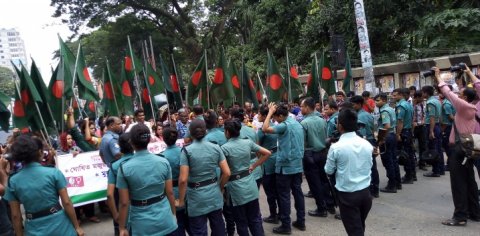
Photo: IndudstriALL
A new minimum wage of 8,000 Taka (US$94), which came into effect on December 9, was rejected by workers and their unions asserting that the increase, the first of its kind since 2013, did not cover the rise in prices over the last five years. Bangladeshi unions, including those in the IndustriALL Bangladesh Council, have been demanding a monthly minimum wage of 16,000 taka (US$191).
At the end of December, approximately 50,000 garment workers walked out of their factories to protest the inadequate increase. Various skirmishes between workers and police ensued. On January 8, one worker was killed and over 50 injured when Bangladesh police forces attacked close to 5,000 striking garment workers.
Over the eight days of intensified worker protests, police used rubber bullets, tear gas and water cannons to disperse the crowd which had doubled in size since the violent Tuesday clash.
“We strongly condemn the use of deadly force against striking garment workers in Bangladesh,” said IndustriALL Global Union’s assistant general secretary, Jenny Holdcroft. “Garment workers’ anger over wage disparities highlights the urgent need for industry bargaining to enable unions to negotiate fair wage outcomes for all workers.”
In response to ongoing worker protests and international pressure condemning the inadequate minimum wage increase, the Government of Bangladesh established a special tri-partite committee to review a possible additional increase to the minimum wage.
Read more:
Garment worker killed and 50 injured in Bangladesh clashes (IndustriALL)
Baton-wielding Bangladesh police fire tear gas to break up garment pay clashes (Reuters)
Police clash with garment factory workers in Bangladesh (Fashion United)